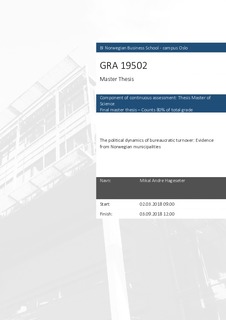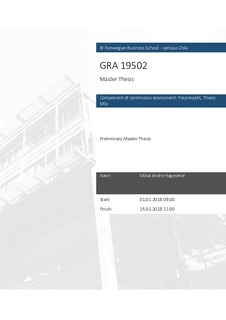| dc.contributor.author | Hageseter, Mikal Andre | |
| dc.date.accessioned | 2019-01-08T14:15:11Z | |
| dc.date.available | 2019-01-08T14:15:11Z | |
| dc.date.issued | 2018 | |
| dc.identifier.uri | http://hdl.handle.net/11250/2579764 | |
| dc.description | Masteroppgave(MSc) in Master of Science in Business, Economics - Handelshøyskolen BI, 2018 | nb_NO |
| dc.description.abstract | An emerging literature shows that bureaucrats in countries with strong
meritocratic traditions are exceedingly influenced by political factors. Agentprincipal
theories predicts that if bureaucrats have policy preferences they should
optimally self-select to work under councils with aligned preferences. Following
elections, the council composition changes and the bureaucrat and council
relationships become less congruent. Bureaucrats value their employment less and
are more likely to resign or be replaced by the newly elected council. This
hypothesis is tested on the turnover of the top bureaucrat in municipal Norway
using yearly panel data of 414 municipalities in the period 1991-2016. The
models of choice are linear probability models allowing for both fixed effects and
extensive controls. Within the first year after municipal elections there are
significantly higher turnover rates. Using changes of which party elect mayor as
the regressor yield even stronger effects. Additional analyses uncover threshold
effect, and bureaucrats in larger municipalities have much higher risk of
replacement. The general conclusion is that although there is significant evidence
of increased turnover following changes of mayor, there is uncertainty how much
can attributed to policy differences. | nb_NO |
| dc.language.iso | eng | nb_NO |
| dc.publisher | Handelshøyskolen BI | nb_NO |
| dc.subject | economics | nb_NO |
| dc.subject | samfunnsøkonomi | nb_NO |
| dc.title | The political dynamics of bureaucratic turnover: Evidence from Norwegian municipalities | nb_NO |
| dc.type | Master thesis | nb_NO |

